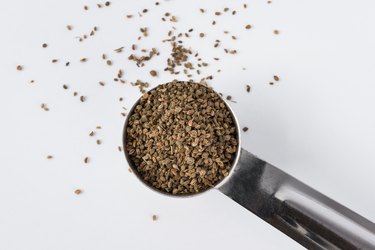
Celery supplements are available as celery seed extract, fresh or dried seeds, tablets and as capsules filled with celery seed oil. Although celery seed and extract is used to treat a number of health conditions, few human studies support this, and you may experience side effects with its use.
Uses of Celery Seed
Video of the Day
Celery is commonly consumed as a vegetable and its components such as seeds are commonly used as a food seasoning ingredient. Parts of the celery plant, botanically known as Apium graveolens, have been used therapeutically for thousands of years. Ayurvedic medicine uses celery seed to treat water retention, colds and flu, poor digestion, different types of arthritis and certain diseases of the liver and spleen, according to Penn State Hershey Medical Center.
Video of the Day
An article in the 2013 Journal of Drug Discovery and Therapeutics reports that celery and celery seed tea are often used as a diuretic, which means it helps the body eliminate water by increasing urine output. In addition, potential celery seed benefits include the treatment of ailments such as edema, gout, flatulence, chronic pneumonia and obesity. Celery has shown promise as a natural therapy for these and other health issues in animal studies, but remains to be proven effective in humans.
A common dietary herbal intervention for gout is celery. A study in Preventive Medicine and Food Science, published in June 2018, investigated the effect of celery and its hydroalcoholic extracts on the treatment of gout. Although the results demonstrated that celery could reduce the uric acid level in mice, no human studies have been conducted. More n Vito research is needed to verify these preliminary findings.
Side Effects from Celery Seeds
Although herbal remedies are generally accepted as complementary and alternative therapies in combination with other medications, herbs can have side effects and interact with other herbs, supplements and medications. For these reasons, you should only take celery seed supplements under the supervision of a health care provider.
Pregnant women should not take celery supplements or drink celery seed tea. A report in a study, published in Pharmacognosy Review in June 2017, says large amounts of celery may lead to muscle contractions in the uterus and uterine bleeding, both of which could increase the risk of miscarriage. The safety of taking celery oil and seeds if you are breastfeeding is unknown, so it's best to avoid their use if that's the case.
If you have low blood pressure, you should use caution when considering celery seed extract as a supplement. Evidence from a preliminary study in Natural Medicine Journal in April 2013 indicated that celery seed extract may decrease both systolic and diastolic blood pressure. Further studies are needed to confirm these results so, to play it safe, monitor your blood pressure if you are taking a celery supplement.
Some of the phenolic compounds in celery seeds can cause your skin to become very sensitive to the sun's UV rays, according to Penn State Hershey. Do not use celery seed or apply celery seed oil if you are in the sun for an extended period of time. If you use celery seed extract, make sure to use sunscreen or sunblock lotions to protect your skin from sunburn.
Read more: The 27 Safest Sunscreens and 3 to Avoid
Allergic Reactions to Celery
Celery is known to be dangerous for allergic individuals. It contains allergens that may provoke severe allergic reactions, including anaphylaxis, reports the 2017 Pharmacognosy Review study. According to Penn State University, if you are allergic to birch pollen, you are likely to also be allergic to celery seeds.
There is a cross reactivity with all forms of celery, including celery salt, celery root, celery seed and commercial products that contain celery seed, such as Old Bay seasoning. Symptoms of celery allergy can afflict your mouth, with itching and swelling of the lips, tongue and throat, reports the University of Nebraska - Lincoln.
If the celery plant is infected with the fungus Sclerotinia sclerotiorum, skin contact can cause dermatitis in sensitive people, according to the Journal of Drug Discovery and Therapeutics. Other reactions that can result from handling the plant or eating large amounts of celery seeds include tiredness, slowed breathing and decreased heartbeat, warns Summit Medical Group.
An allergy to celery seed may cause rare but severe life-threatening reactions in some people. If you experience any of the following symptoms, get immediate medical attention:
- A swollen throat or the constriction and tightening of the airways
- Shock, along with a severe drop in blood pressure
- Rapid pulse
- Dizziness or loss of consciousness
Before taking a supplement containing celery seed extract, ask your doctor if you are on any medication that may interact with the herb. Some of these include lithium, diuretics, anticoagulants and thyroid medications, according to Penn State Hershey.
- Summit Medical Group: "Celery"
- Penn State Hershey Medical Center: "Celery Seed"
- Journal of Drug Discovery and Therapeutics: "Medical Benefits of Apium Graveolens (Celery Herb"
- Preventive Medicine and Food Science: "Inhibitory Effects of Apium graveolens on Xanthine Oxidase Activity and Serum Uric Acid Levels in Hyperuricemic Mice"
- Pharmacognosy Review: "An Updated Phytopharmacological Review on Medicinal Plant of Arab Region: Apium Graveolens Linn"
- Rxlist: "Celery"
- Natural Medicine Journal: "A Pilot Study to Evaluate the Antihypertensive Effect of a Celery Extract in Mild to Moderate Hypertensive Patients"
- American Academy of Allergy, Asthma, Immunology: "Allergy to Celery"
- McCormick for Chefs: "Old Bay"
- University of Nebraska - Lincoln: Food Allergy Research and Resource Program: "Allergenic Foods and their Allergens, with links to Informall"
- Mayo Clinic: "Food Allergy"